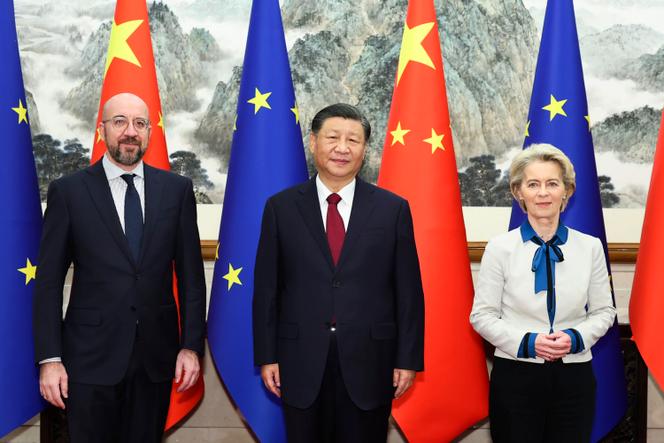


EU President Ursula von der Leyen told Chinese leader Xi Jinping on Thursday, December 7, that the bloc and its biggest trading partner must address their differences, as they began the first in-person EU-China summit in over four years. China and the EU have ramped up diplomatic engagement this year in an attempt to steer post-pandemic recovery and repair damaged ties, with a number of its commissioners visiting Beijing to restart high-level dialogue.
In opening remarks, von der Leyen, flanked by European Council President Charles Michel and EU foreign policy chief Josep Borrell, thanked Xi for the "warm welcome" on what is her second trip to China this year. "But there are clear imbalances and differences that we must address," she said. "At times our interests coincide," she said, pointing to EU-China cooperation on artificial intelligence and climate change. "And when they do not, we need to address and responsibly manage the concerns that we have," she added.
Michel, in turn, said the bloc was seeking a "stable and mutually beneficial" relationship with China. But, he said, the EU would also "promote our European values including human rights and democracy" at the summit. The bloc says it hopes the meetings will provide a chance to discuss areas of common interest.
In his opening remarks, President Xi told his European visitors they must "jointly respond to global challenges." Beijing has said the meeting will "play an important role in building on the past and ushering in the future." "China and Europe are partners, not rivals, and their common interests far outweigh their differences," foreign ministry spokesman Wang Wenbin said this week.
Underlining Beijing's challenges in getting Europe onside, news broke on the eve of the summit that Italy – the bloc's third-largest economy – had withdrawn from its vast Belt and Road infrastructure initiative.
Thursday's talks are set to address more touchy topics too, from human rights to the yawning EU-China trade gap.
Von der Leyen warned this week that the bloc would "not tolerate" that imbalance indefinitely. "We have tools to protect our market," she told Agence France-Presse (AFP). European officials have said repeatedly this year they aim to "derisk" their economic ties to China after the war in Ukraine exposed the continent's energy dependence on Russia. Beijing hit back on Wednesday, saying the bloc's efforts to curb exports of sensitive tech to China while balancing trade didn't "make sense."
Also on the agenda at the summit will be the fighting between Israel and Hamas – as well as Russia's war in Ukraine. China, which has not condemned Moscow's February 2022 invasion of its neighbor, welcomed Russian President Vladimir Putin to Beijing in October, with Xi hailing their "deep friendship".
The Europeans have said they will urge Beijing to use its ties with Moscow to push it to end its war against Ukraine. While China has stopped short of providing military aid to Moscow, it has deepened economic ties as Western powers seek to isolate Russia. Tensions over self-ruled Taiwan will also feature prominently in the talks, the bloc has said.
Meanwhile, China slammed what it called the "smearing" of its Belt and Road infrastructure project after Italy said it would withdraw four years after it became the only G7 nation to sign up. A day before the summit in Beijing, Italy said it had formally withdrawn from the BRI, a central pillar of President Xi Jinping's bid to expand China's clout overseas.
Prime Minister Giorgia Meloni has long been opposed to Italy's participation in an initiative viewed by many as an attempt by Beijing to buy political influence – and whose economic benefits to Rome were limited. An Italian government source confirmed to AFP on Wednesday that Rome had pulled out of the initiative.
The foreign ministry did not directly comment on Italy's decision to withdraw from Beijing's vast BRI project, a central pillar of President Xi Jinping's bid to expand China's clout overseas. However, Wang pointed to the more than 150 participating countries as evidence of it being the "most popular international public product and the largest international cooperation platform in the world today." "This embodies the huge appeal and global influence of jointly constructing the Belt and Road," he said. He also noted that Italy had sent representatives to Beijing's BRI forum in October.
Proponents of the BRI praise it for bringing resources and economic growth to the Global South. But critics have long pointed to opaque pricing for projects built by Chinese companies, with countries including Malaysia and Myanmar renegotiating deals to bring down costs.
